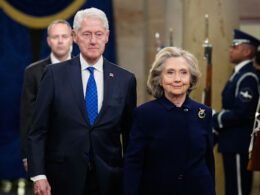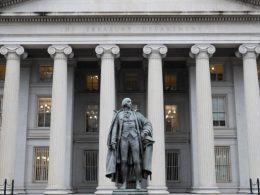Unlock the White House Watch newsletter for free
Your guide to what Trump’s second term means for Washington, business and the world
On a visit to interview President Vladimir Putin last year, the US conservative firebrand news host Tucker Carlson stopped at a Moscow mall to film a segment about how years of sanctions had impacted Russians’ shopping. As he strolled through a branch of Auchan, the French hypermarket chain, Carlson marvelled at the low prices and broad assortment of goods from other western multinationals. “Looks pretty non-sanctioned to me,” Carlson said, “but what do I know?”
The bounty (and Bounty bars) on offer were emblematic of Russia’s resilience to western economic pressure since Putin ordered the full-scale invasion of Ukraine. Instead of returning to the empty shelves of the late Soviet era, most western consumer goods remain widely available. Russia’s oil exports fund the Kremlin’s splurge on defence and trickle into ordinary Russians’ pocketbooks. The technocrats who led Russia’s efforts to integrate its economy with the west are now the vanguard of the Kremlin’s fightback against sanctions.
Today’s economic warfare is rooted in three decades of failed attempts to draw Russia closer to the west, Thane Gustafson, a professor at Georgetown University, argues in Perfect Storm. Instead of drawing the cold war adversaries together, efforts to integrate Russia into the capitalist system gave each side powerful weapons against the other. When Putin’s tanks rolled into Ukraine in 2022, Kyiv’s allies responded by expelling Moscow from global markets and supply chains. Russia cut Europe off from cheap gas supplies and crowed that the continent would soon freeze.
Gustafson traces how the euphoria that greeted American-style capitalism’s arrival in Russia masked a brooding resentment at the Soviet empire’s defeat. Russians stood in lines for hours at Moscow’s first McDonald’s when it opened in 1990, but were less excited about swallowing triumphalist, often condescending advice from their western betters — or “spinach”, as former senior US diplomat Victoria Nuland put it. “I know you guys would like to come here and teach us heathens how to eat with a fork and knife and just to make sure we brush our teeth the right way,” the Russo-Georgian tycoon Kakha Bendukidze quipped.
In any case, the Russians had their own way of doing biznes. Boris Yeltsin’s liberal economic reformers lamented the lack of a Marshall Plan for Russia, as the US had arranged to rebuild Europe after 1945, but did much to discredit western capitalism themselves. Their “shock therapy” reforms immiserated millions, while a loans for shares deal to keep Yeltsin in power enriched a tiny coterie of oligarchs. As western companies leapt to get their hands on Russia’s riches, those who had already made it in biznes headed the other way. Inflows into the country totalled over $630bn from 1992 to 2020 but were dwarfed by an estimated $800bn of Russian money held outside the country.
This created a vulnerability that western sanctions have sought to exploit, limiting Russia’s ability to sell commodities abroad and import irreplaceable goods for its war machine with the proceeds. But predictions of economic disaster, made in Washington and Moscow alike at the war’s outset, have not come to pass. Gustafson finds the sanctions have been too incremental, often laxly enforced, and rarely with a clear goal in mind. The most successful have constrained Russia’s financial flows. He writes: “the Russian dependence on the western financial system became its greatest source of vulnerability”. Russia has proved skilful at evading those, too — as evidenced by the western components found in missiles that strike Ukraine, often smuggled through its ally China.
Summer Books 2025

The best titles of the year so far — from politics, economics and history to art, food and, of course, fiction, FT writers and critics choose their favourite reads of the year so far
Gustafson holds out hope that what remains from Russia’s opening to the west could help the sides reconcile once Putin is finally gone. He even sketches out a future president’s speech in which Moscow renounces Putin’s imperialism, accepts its goals in Ukraine are unattainable, and rejects its dependence on Beijing.
Putin’s war, however, has laid new foundations that will be difficult for any successor to shake off. Power and wealth are in the hands of a venal elite in the security services. Sanctions have fuelled resentment even among an elite that once looked to the west. No western companies have made an effort to return to Russia. And those who have profited in their absence are in no rush to welcome them back. Or, as Putin put it last month when he backed efforts to block McDonald’s from returning: “Only cowards pay their debts.”
Perfect Storm: Russia’s Failed Economic Opening, the Hurricane of War and Sanctions, and the Uncertain Future by Thane Gustafson Oxford £22.99, 328 pages
Max Seddon is the FT’s Moscow bureau chief
Join our online book group on Facebook at FT Books Café and follow FT Weekend on Instagram, Bluesky and X









